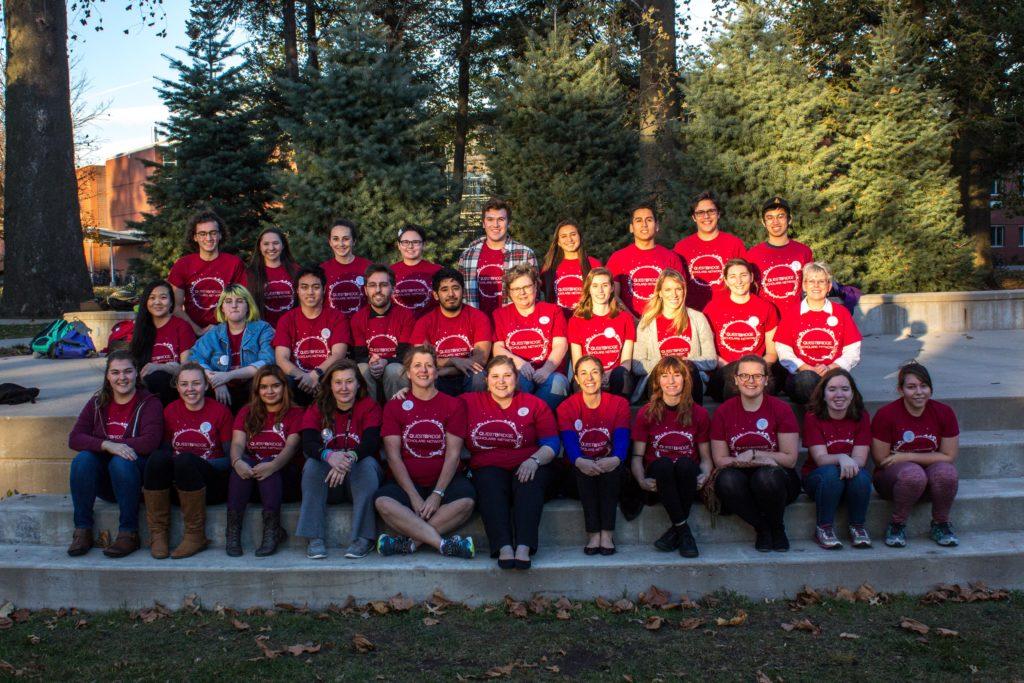By Lily Bohlke
bohlkeli@grinnell.edu
This week marks Grinnell’s first Social Class Awareness Week. Questbridge liaison Tim Burnette ’19 collaborated with the Questbridge team and Intercultural Affairs to plan a slew of events, including talks by professors, a student panel and a film screening.
The week began on Monday, Nov. 14 with a first generation student talk by Professor Liz Queathem, biology. On Wednesday, Professor Kesho Scott, sociology, delivered a talk called “Low Income and First-Gen in Higher Ed.” On Thursday, Professor Fredo Rivera ’06, art history, spoke about Social Class and Academia. Later that evening, there was a Low Income Student Panel. The week will finish off tonight at 7 p.m. in ARH 302, with a showing of “Low Income @Grinnell” by Kara Jones ’00.
Beyond this designated week, however, Burnette hopes discussions about social class will continue on campus. In the film “Low Income @Grinnell,” Jones emphasizes “dress down culture,” in which affluence is often not visible through appearance and clothing. Burnette said that although it may be less applicable now than it was in 2000, the culture behind affluence still exists at Grinnell.
“There are people here who aren’t middle class, who aren’t rich. There are people here who don’t have family members who have ever been to college. Social class comes up in conversations but it usually doesn’t come up in a Grinnell context,” Burnette said.
Burnette’s goal for the week is both to raise awareness about the presence of class differences at Grinnell and to reassure students who are low income or first generation that there are support systems and resources in place, as well as other students and faculty who can relate.
“I hope students know that there are resources among faculty and staff for thinking about issues of class on Grinnell’s campus, but more broadly throughout the town,” Rivera said. “I hope it comes up more broadly throughout this week, particularly given the recent election, that we think about the politics of class and what it means from within our bubble on campus and then outside of that.”
Supportive resources on financial politics are especially important during a transition period, such as the current transition into Donald Trump’s presidency. Rivera explained that Grinnellians who rely on federal financial aid need to be aware of changing educational and financial policies. When Rivera was a Grinnell student in the early 2000s and President George W. Bush was elected, Pell Grant funding structures were transformed.
“One of my colleagues was impacted. She was eligible for the Pell Grant her freshman year; she was not eligible the following year. The threshold had changed,” he said. “How we qualify low income students … [is based] on certain criteria that are in flux and dependent on certain political contexts.”
To encourage discussions about socioeconomic diversity on campus, Rivera helped found a group called Grinnellians for Economic and Social Diversity when he was a student. According to Rivera, there was less socioeconomic diversity at Grinnell in the early 2000s than there is now, particularly in regards to racial and ethnic diversity.
“We wanted to discuss diversity in an intersectional manner and also deal with things the campus wasn’t dealing with back then. [In my talk,] I wanted to give that history of student activism and think about the significance of class diversity and issues around diversity [over the course of] the past two decades on campus,” Rivera said.
Grinnellians for Economic and Social Diversity initiated a textbook lending library, from which low income students could borrow textbooks and course materials for a semester, donated by past students who had taken the course. After the group members graduated, the lending library died out.
“It’s a matter of resources, investment and student interest,” Rivera explained.
Last year, however, Burnette started a new textbook lending library on campus. He plans to continue discussions about social class to make sure all Grinnellians are aware of the socioeconomic diversity of students, and how that applies to everyday life.

Burnette emphasized the importance of realizing that not everyone is able to go out to eat or go to the movie theater. He said he is lucky to have found a group of friends who understand his situation, but not all low-income students do.
“All the events [in Social Class Awareness Week] are intended for everyone. My goal with the whole week is to have professors and students talk about their experiences so that everyone can hear it,” Burnette said. “It’s just as much to raise awareness as to say you’re not alone. For the students who are low-income, first-gen, there are people like you, there are professors like you. I want people to acknowledge and realize that [social class] is present.”


































































